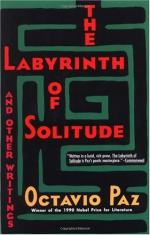|
This section contains 1,082 words (approx. 4 pages at 300 words per page) |

|
[In Labyrinth of Solitude] Paz shifts the focus of his analysis away from the Mexican ethos to a universal level, recognizing that the problems he has been discussing are basic to human nature.
Paz develops his central ideas, solitude and search for communion, as follows: the foetus, at one with the world that surrounds it, senses loss and rejection at birth. As self-consciousness develops, this original sensation turns into one of loneliness. Self-awareness means solitude, and because of our solitude, we yearn to transcend ourselves…. All our being longs to escape from the opposites that tear at us and to be reborn to the fullness of being in which life, death, time, eternity, and all other dualities are reconciled. Love …, which takes us out of ourselves, is a craving for communion, a need to die and be reborn in the other; and in the union of love, a...
|
This section contains 1,082 words (approx. 4 pages at 300 words per page) |

|


